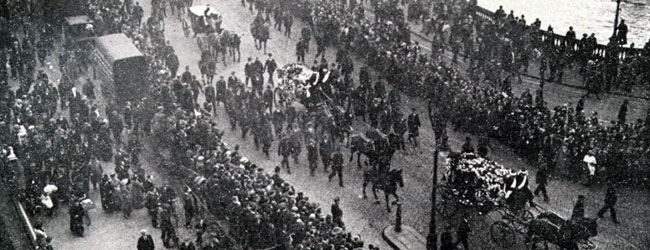1 October 2010
Remembering the Past BY MÍCHEÁL Mac DONNCHA
Terence MacSwiney dies as the world watches
ONE EVENT more than any other in 1920 brought international attention to the Irish people’s struggle for freedom and that was the hunger strike and death in London of the Sinn Féin Lord Mayor of Cork and Irish Republican Army officer Terence MacSwiney.
Terence MacSwiney was elected mayor of his native city in March 1920 following the murder by the Royal Irish Constabulary of his friend and comrade and predecessor as mayor, Tomás Mac Curtáin. Speaking in Cork City Hall after his election, MacSwiney uttered his most famous words and also appealed to international opinion:
“This contest is not on our side a rivalry of vengeance but one of endurance, it is not they who can inflict the most, but they who can suffer the most who will conquer...
“The civilised world dare not look on indifferent while new tortures are being prepared for our country or they will see undermined the pillars of their own governments and the world involved in unimaginable anarchy.”
MacSwiney’s philosophy was both highly idealistic and outward looking. For the IRB newspaper Irish Freedom he wrote a series entitled Principles of Freedom. He called for “worldwide unity, not of government but of brotherhood”. He urged people to reflect on “the common origin of the human race, on the beauty of the world that is the heritage of all, our common hopes and fears, and in the greatest sense the mutual interests of the peoples of the earth”.
This sense of international solidarity was seen in the reaction to MacSwiney’s own protest fast and death.
HE BEGAN his hunger strike when he was arrested in a raid on Cork City Hall on August 12th. He was taken to Brixton Prison in London, the British hoping thereby to isolate him. In fact, the move to the British capital, where the world’s press was based, served to shine a light on MacSwiney and the struggle he represented.
London’s Daily News reported:
“The case of the Lord Mayor of Cork seems to be exciting greater interest in the foreign press than in our own. In Paris and Rome, most of the papers treat the case as the most important of the news items, and some of the French papers are running it as a daily news item...
“The present policy of repression in Ireland is doing not a little to injure British and French unity.”
A leading German newspaper said that if MacSwiney died he would be more powerful than the Prime Minister or the King of England. The Chicago Tribune said the case was “the Irish question at its highest point of drama”.
The British Labour Party said the British Government’s Irish policy “has stained the name of Britain with dishonour” and the British Trades Union Congress said they would hold the Government responsible for MacSwiney’s death and that “such blind stupidity will render reconciliation between Ireland and Britain almost impossible”.
• Terence MacSwiney died in Brixton Prison at 5.40am on October 25th, the 74th day of his hunger strike.
Follow us on Facebook
An Phoblacht on Twitter
Uncomfortable Conversations

An initiative for dialogue
for reconciliation
— — — — — — —
Contributions from key figures in the churches, academia and wider civic society as well as senior republican figures





